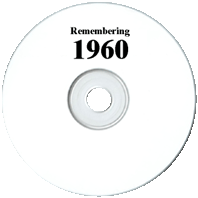

In the year 1960, it felt as though the future was about to begin as a new President would be elected, but it was also a year with many changes in Radio.

31 old time radio show recordings
(total playtime 12 hours, 15 min)
available in the following formats:
1 MP3 CD
or
12 Audio CDs
Text on OTRCAT.com ©2001-2026 OTRCAT INC All Rights Reserved. Reproduction is prohibited.



A member of the British Ministry of Colonies prophesied in January that 1950 would be "The Year of Africa" because many states seemed to be on the edge of declaring independence from their former colonial masters. The former colonial powers had a tough time in the aftermath of WWII, and independence movements began to flourish across the dark continent. The number of independent nations in Africa rose from nine to twenty-six by the end of the year as Belgium, France, and the United Kingdom all lost colonies. Some of the former colonies maintained at east cultural ties with their former masters, but in many cases, the new nations were determined to regain the power and influence they enjoyed before the domination of outsiders. From a The Cold War perspective, there were some fears in the West that any political turmoil would be an opportunity for Soviet adventurism.

In radio, the "Payola Scandal" led to the National Association of Broadcasters announcement in January that fines could be charged against disk jockeys who accepted money from record companies to "push" certain songs on their shows. The scandal did a great deal of harm to the reputation of early Rock and Roll promoter Alan Freed. Scandals involving Rock and Roll music helped to further solidify the popularity of the Grand Ol' Opry, which had been on the air since 1925 (and continues to be broadcast every Saturday). Airing almost as long, Amos 'n' Andy's last broadcast as the Amos 'n' Andy Music Hall was on November 25. The TV version of Have Gun – Will Travel would remain on the air until the end of the 1963 season, but the radio version was also canceled in November of 1960. One of the greatest radio Westerns of them all, Gunsmoke, was entering what would be its last season, although the TV version would go on until 1975, with twenty seasons it would be one of the longest running scripted programs on TV. Actor Bob Bailey, widely considered "the best of the Johnny Dollars" left the show at the end of the season, leaving Bob Readick and Mandel Kramer to complete the run.
See also: Presidential Election 1960
Text on OTRCAT.com ©2001-2026 OTRCAT INC All Rights Reserved. Reproduction is prohibited.
You have reached the maximum number of votes for a unregistered user.
Please login or create a new account to continue...
You have reached the maximum number to down votes in this page.



1960 Disc A001
|
Add Audio CD to Cart - $5.00 |
1960 Disc A002
|
Add Audio CD to Cart - $5.00 |
1960 Disc A003
|
Add Audio CD to Cart - $5.00 |
1960 Disc A004
|
Add Audio CD to Cart - $5.00 |
1960 Disc A005
|
Add Audio CD to Cart - $5.00 |
1960 Disc A006
|
Add Audio CD to Cart - $5.00 |
1960 Disc A007
|
Add Audio CD to Cart - $5.00 |
1960 Disc A008
|
Add Audio CD to Cart - $5.00 |
1960 Disc A009
|
Add Audio CD to Cart - $5.00 |
1960 Disc A010
|
Add Audio CD to Cart - $5.00 |
1960 Disc A011
|
Add Audio CD to Cart - $5.00 |
1960 Disc A012
|
Add Audio CD to Cart - $5.00 |
Please wait...
COMMENTS
Richard Verified Purchase
Leave a comment